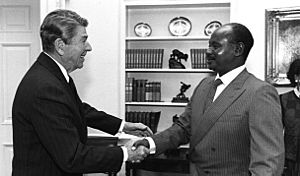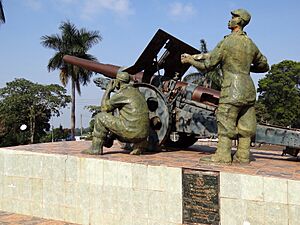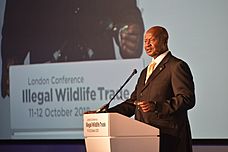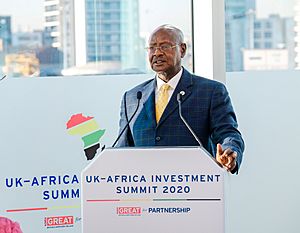Yoweri Museveni facts for kids
Quick facts for kids
Yoweri Museveni
|
|
|---|---|
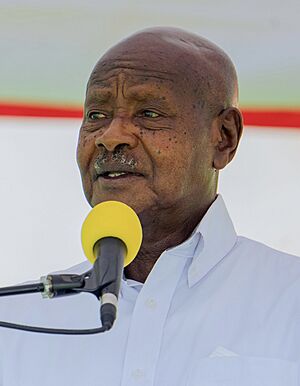
Museveni in 2024
|
|
| 9th President of Uganda | |
| Assumed office 26 January 1986 |
|
| Prime Minister |
See list
Samson Kisekka
George Cosmas Adyebo Kintu Musoke Apollo Nsibambi Amama Mbabazi Ruhakana Rugunda Robinah Nabbanja |
| Vice President |
See list
Vacant
(1986–1991) Samson Kisekka (1991–1994) Specioza Kazibwe (1994–2003) Gilbert Bukenya (2003–2011) Edward Ssekandi (2011–2021) Jessica Alupo (2021–present) |
| Preceded by | Tito Okello |
| 31st Secretary General of the Non-Aligned Movement | |
| Assumed office 16 January 2024 |
|
| Preceded by | Ilham Aliyev |
| Personal details | |
| Born |
Yoweri Kaguta Museveni Tibuhaburwa
15 September 1944 Ntungamo, Protectorate of Uganda |
| Political party | NRM |
| Other political affiliations |
UPM (1980–1986) |
| Spouse |
Janet Kataaha
(m. 1973) |
| Children | Muhoozi Kainerugaba Natasha Karugire Patience Rwabwogo Diana Kamuntu |
| Parents |
|
| Education | University of Dar es Salaam |
| Signature | |
| Military service | |
| Allegiance | |
| Branch/service | Front for National Salvation Popular Resistance Army National Resistance Army |
| Years of service | 1971–1986 |
| Rank | General |
| Battles/wars | 1972 invasion of Uganda Uganda–Tanzania War Ugandan Bush War |
Yoweri Kaguta Museveni Tibuhaburwa (born 15 September 1944) is a Ugandan politician. He has served as the ninth President of Uganda since 1986. Museveni was born in Ntungamo, Uganda, when it was under British rule. He studied political science at the University of Dar es Salaam. There, he started a student activist group.
In the 1970s, Museveni was involved in efforts to oppose the government of President Idi Amin. He helped form the Front for National Salvation. This group fought alongside Tanzanian forces to overthrow Amin. After a disputed election in 1980, Museveni led a movement called the National Resistance Movement. This led to the Ugandan Bush War. He became president on January 29, 1986, after a key battle in Kampala.
As president, Museveni worked to bring peace to Uganda. He also guided Uganda's involvement in regional conflicts. His time in office has seen economic growth. However, he has also faced criticism for limiting political freedoms. He was re-elected for a sixth term in January 2021. In January 2026, he was declared the winner of the presidential election for his seventh term.
Contents
Yoweri Museveni: Leader of Uganda
Early Life and Education Journey
Yoweri Museveni was born on September 15, 1944. His parents were Mzee Amos Kaguta, a cattle keeper, and Esteri Kokundeka Nganzi. He belongs to the Hima ethnic group. His family moved to Ntungamo in the 1960s. This area was then part of the British Protectorate of Uganda.
Museveni attended Kyamate Elementary School. He also went to Mbarara High School and Ntare School. For his university studies, he went to the University of Dar es Salaam in Tanzania. He studied economics and political science there. At university, he started a student group called the University Students' African Revolutionary Front. He also received some military training during this time.
Path to Presidency
Fighting for Change in Uganda
Museveni began working with other thinkers. They wanted to challenge the Ugandan government. When President Milton Obote was overthrown by Idi Amin in 1971, Museveni's group joined others to oppose Amin. They operated from Tanzania. They gathered information and carried out missions in Uganda.
In 1972, a group of exiles tried to invade Uganda. This attempt was unsuccessful. Museveni's group faced many challenges. He then formed the Front for National Salvation (FRONASA) in 1973. In August of that year, he married Janet Kainembabazi.
The Bush War and Peace Efforts
In 1978, Ugandan troops invaded Tanzania. This started the Uganda–Tanzania War. Tanzanian President Julius Nyerere ordered a counter-attack. He also gathered Ugandan opposition groups. Museveni and his FRONASA troops joined the Tanzanian forces. They helped in the counter-invasion of Uganda. They were part of capturing Mbarara in 1979.
After Amin was overthrown, there was a disputed election in 1980. Milton Obote returned to power. Museveni and his supporters returned to Uganda. They formed the Popular Resistance Army (PRA). They planned a rebellion against Obote's government. The PRA later joined with another group to create the National Resistance Army (NRA). Its political side was the National Resistance Movement (NRM).
In 1985, a military coup overthrew Obote. Lieutenant-General Tito Okello took power. Museveni's NRM/NRA felt their efforts were ignored. However, they agreed to peace talks in Nairobi, Kenya. The talks were difficult. The agreement called for a ceasefire and combining forces. But these conditions were not met.
On January 20, 1986, forces loyal to Amin entered Uganda. They were supported by the Zairean military. Government troops in Kampala began to leave their posts. The rebels gained ground.
Museveni's Time as President
Museveni became president on January 29, 1986. He promised a return to democracy. He told thousands of people outside the Ugandan parliament that "The people of Africa, the people of Uganda, are entitled to a democratic government."
First Years and National Growth
Uganda started an Economic Recovery Program in 1987. This program aimed to boost growth, investment, and exports. It also worked to remove barriers to trade. The goal was to improve the economy through private businesses.
The NRM government promised to bring security and respect for human rights. Museveni stated that people should be safe. He said that anyone threatening security must be stopped. However, the NRM faced several challenges. They fought against various groups in different parts of Uganda. The northern region, near the Sudanese border, was particularly difficult.
The NRA gained a reputation for respecting civilians. But some members were criticized for their actions. There were also concerns about young people being involved in fighting.
Elections and Political Changes
The first elections under Museveni were held in 1996. He won with 75.5 percent of the vote. He was sworn in for his second term on May 12, 1996. In 1997, he started free primary education for children.
In the 2001 elections, Museveni won again with 69 percent of the vote. His former friend, Kizza Besigye, was his main opponent. Besigye challenged the results in court. The court found some problems but decided they did not change the overall outcome.
Museveni was chosen to lead the Organisation of African Unity (OAU) in 1991 and 1992. His government also had a successful campaign against HIV/AIDS. Uganda's infection rates became much lower. This was a global success story. In 1998, Uganda received significant debt relief.
Museveni also supported programs for women. He had a female vice-president for almost ten years. He encouraged women to attend college.
Uganda's Role in Africa
After the Rwandan genocide in 1994, Rwanda felt unsafe. Former Rwandan soldiers were in the Democratic Republic of the Congo (DRC). Rwanda, with Museveni's help, supported rebels to overthrow the leader of the DRC. This led to the First Congo War.
In 1998, Uganda and Rwanda entered the DRC again. This was during the Second Congo War. Uganda stated its reasons were to stop violence and secure its border. However, there were criticisms about how resources were managed. In 2005, the International Court of Justice ruled that Uganda should pay compensation to the DRC.
In 2007, Museveni sent Ugandan troops to help with peacekeeping in Somalia. He also worked to attract investors to Uganda.
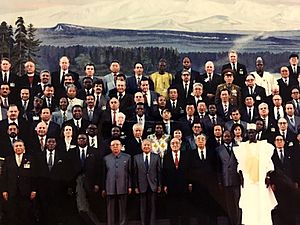
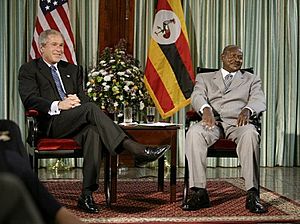
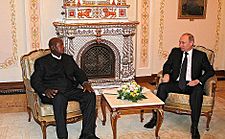
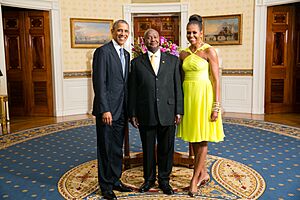
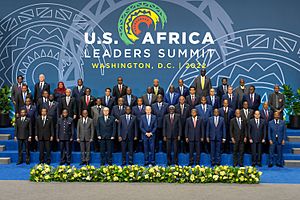
Recent Elections and Leadership
After the 2001 elections, there was a campaign to remove presidential term limits. The 1995 constitution limited a president to two terms. In 2005, the term limits were removed. This allowed Museveni to run again. Critics worried about too much power in one leader's hands. They also raised concerns about political freedoms.
In July 2005, a referendum allowed political parties to operate freely again. Before this, candidates ran as individuals. Many saw this as a step towards more open politics.
In November 2005, Museveni was chosen as his party's candidate for the 2006 elections. The main opposition leader, Kizza Besigye, was arrested on serious charges. This led to protests. Several European countries reduced aid to Uganda due to concerns about democracy.
The 2006 elections were the first multi-party elections in 25 years. Museveni won with 59 percent of the vote. Besigye claimed fraud. Observers noted issues, but the Supreme Court upheld the results.
Museveni was reelected in 2011 with 68 percent of the vote. The election results were disputed by some. In 2011, there were protests against the high cost of living. The government's response to these protests faced criticism.
In 2014, Museveni signed a bill into law. This bill caused international concern. He also criticized the US's involvement in the Libyan Civil War. He argued for "African solutions for African problems."
In the 2016 election, Museveni was reelected with 61 percent of the vote. Opposition candidates again claimed fraud and intimidation. In 2017, he signed a bill removing the presidential age limit. This allowed him to run for president again. This decision led to public protests and legal challenges. Critics worried about the future of democracy in Uganda.
In January 2021, Museveni was reelected for a sixth term. He received 58.6% of the vote. Opposition leaders, including Bobi Wine, did not accept the results. They claimed the election had many problems. Independent observers called for investigations into potential fraud. Museveni's government faced criticism for how it handled protests and opposition leaders.
In July 2022, Museveni met with Russian Foreign Minister Sergey Lavrov. He stated that Uganda does not believe in being enemies of others' enemies. In October 2022, Museveni apologized to Kenya for a tweet by his son. In July 2023, he met with Russian President Vladimir Putin. He spoke about the importance of dialogue in conflicts. After the conflict in the Middle East in October 2023, Museveni called for dialogue and a peaceful solution.
In January 2026, Museveni was officially declared the winner of the presidential election. He secured 71.65% of the vote. This marked his seventh term as president.
Family Life
Museveni is an Anglican and a member of the Church of Uganda. He is married to Janet Kataaha Museveni. They have four children:
- Muhoozi Kainerugaba – born in 1974, a general in the Uganda People's Defence Forces.
- Natasha Karugire – born in 1976, a fashion designer and consultant.
- Patience Rwabwogo – born in 1978, a pastor.
- Diana Kamuntu – born in 1980.
Election Results Over Time
| Year | Office | Party | Votes received | Result | ||||
|---|---|---|---|---|---|---|---|---|
| Total | % | P. | Swing | |||||
| 1996 | President of Uganda | IND | 4,458,195 | 74.33% | 1st | N/A | Won | |
| 2001 | 5,123,350 | 69.33% | 1st | −5.00 | Won | |||
| 2006 | NRM | 4,109,449 | 59.26% | 1st | −10.07 | Won | ||
| 2011 | 5,428,369 | 68.38% | 1st | +9.12 | Won | |||
| 2016 | 5,971,872 | 60.62% | 1st | −7.76 | Won | |||
| 2021 | 6,042,898 | 58.38% | 1st | −2.24 | Won | |||
| 2026 | 7,946,772 | 71.65% | 1st | +13.27 | Won | |||
Awards and Recognition
National Honours
Foreign Honours
| Ribbon | Distinction | Country | Date | Reference |
|---|---|---|---|---|
| Order of Playa Girón | 9 January 1988 | |||
| Grand Cross of the Order of Good Hope | November 1997 | |||
| Order of the Republic of Serbia, 2nd Class | 2016 | |||
| Grand Collar of the Order of Independence | 25 August 2017 | |||
| Grand Cross of the National Order of Merit | 30 June 2018 | |||
| Member of the Order of South Africa | 28 February 2023 | |||
| Chief of the Order of the Golden Heart |
Honorary Degrees
| University | Country | Honour | Year |
|---|---|---|---|
| Humphrey School of Public Affairs | United States | Doctor of Laws | 1994 |
| Mbarara University of Science and Technology | Uganda | Doctor of Laws | 2003 |
| Latin University of Theology | United States | Doctor of Divinity | 2007 |
| Fatih University | Turkey | Honorary degree | 2010 |
| Makerere University | Uganda | Doctor of Laws | 2010 |
| University of Dar es Salaam | Tanzania | Doctor of Literature | 2015 |
See also
 In Spanish: Yoweri Museveni para niños
In Spanish: Yoweri Museveni para niños
- Political parties of Uganda
- Politics of Uganda
- Tokyo International Conference on African Development
- History of Uganda (1979–present)
- Uganda Salvation Front
- Henry Tumukunde
 | Jewel Prestage |
 | Ella Baker |
 | Fannie Lou Hamer |


